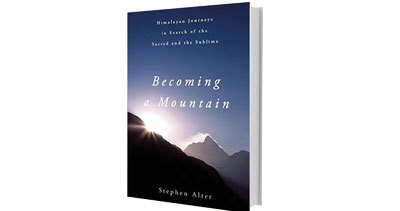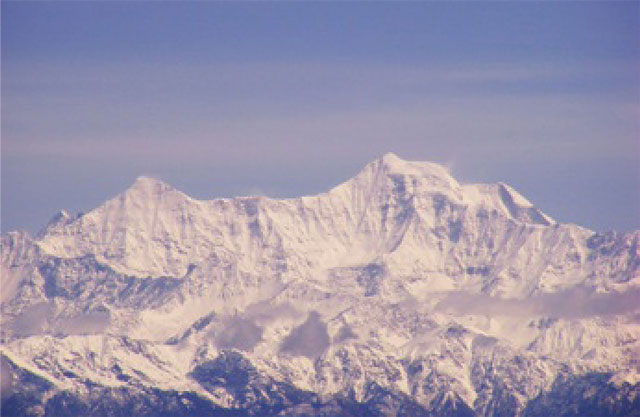
One dark night during the monsoon of 2008, Stephen Alter and his wife Ameeta were rudely awakened by four thugs intent on robbing and killing them. After a violent confrontation, the would-be thieves fled with nothing of value, leaving their two victims near death from beatings, choking, and knife wounds.
The Alters live in Mussoorie, in the Indian Himalayas, slightly over 100 miles west of Nepal. Stephen Alter is a noted writer of novels and nonfiction books on India. In his latest, a memoir and travelogue entitled Becoming a Mountain: Himalayan Journeys in Search of the Sacred and the Sublime, he briefly describes the robbery attempt as the lead into a series of recuperative mountain treks and stories in an attempt to assuage the physical and emotional scars that he suffered. “There was nothing intellectual or literary about what happened,” he writes, but he knew long before the pain wore off that he would write about it. (And, we are assured that there will be no more robberies, with three large Tibetan mastiffs now guarding the house.)
Stephen Alter was born and raised in north India, a son of the principal of Mussoorie’s Woodstock School. The mountain tracks, forests, and fishing streams were his childhood playgrounds, eloquently described in a previous memoir, All the Way to Heaven: An American Boyhood in the Himalayas. So, attuned to the mountains as he was, going to them seemed a natural way to begin the healing he needed. Writing about it was just as natural, for as Paul Bowles notes (and Alter quotes): “Writing is, I suppose, a superstitious way of keeping the horror at bay, of keeping the evil outside.”

‘Becoming a Mountain’, however, is far more than a discourse on distancing one’s self from suffering. It’s a compendium of local lore, myth, legend, belief, and love of mountains. Alter addresses his experiences in terms of both the sacred and the sublime. While he doesn’t believe in the presence of supreme beings amongst the peaks, or in shrines and temples along the way, he nevertheless takes ‘darshan’ where others do, at every opportunity.
 Darshan is a central concept in the book. “Darshan implies being in the presence of a deity, saint, or teacher, sometimes even a natural phenomenon,” he writes. “But, in its purest form, darshan simply means approaching an object of reverence and accepting whatever blessing is bestowed...” Because divinity “lies in the eye of the beholder,” darshan for some can be “a powerful experience that changes a person’s life; for others, a daily routine performed out of habit as much as faith.” Personally, it was as simple as knowing that he was in a special place, reaffirming his birthright, and being refreshed by it.
Darshan is a central concept in the book. “Darshan implies being in the presence of a deity, saint, or teacher, sometimes even a natural phenomenon,” he writes. “But, in its purest form, darshan simply means approaching an object of reverence and accepting whatever blessing is bestowed...” Because divinity “lies in the eye of the beholder,” darshan for some can be “a powerful experience that changes a person’s life; for others, a daily routine performed out of habit as much as faith.” Personally, it was as simple as knowing that he was in a special place, reaffirming his birthright, and being refreshed by it.
He speaks of appreciating mountains “largely as a projection of personal dreams and aspirations, objects that render meaning only within the echo chambers of our imagination.” And as for conquering them, he quotes Edmund Hillary: “It’s not the mountain we conquer but ourselves.”
Well into the book, he defines two kinds of mountain travelers: tourists, who pursue the exotic, and pilgrims, who seek the divine. At a recent book event, I asked him which he was, or if was he was something else. “A little of each,” he said, but also, “a writer, in search of stories.” And it is stories that make this book: his own, those of fellow pilgrims, and others; stories deeply moving, fascinating, entertaining, insightful, unforgettable. Retelling them is Alter’s way of writing a mountain.
***
For Stephen Alter, and most of us, the Himalayas are special. “More than any other range on earth,” he writes, “the Himalayas contain a rarified atmosphere of sanctity. Most seekers are content to find their gods on the lower slopes and passes, as well as in the valleys below these peaks. But some believe that they must ascend into the snowy heights in order to achieve transcendence.”
We see and experience many things in the wildness of mountains, on the peaks, alongside the trails, in the forests, by the lakes and streams, and at the edifices we erect for one or another reason. But becoming a mountain, he writes, is not just feeling good in seeing one up close, or even thinking like one. And it does not always mean that we have to reach the top, the peak. (He’s not a mountaineer in the strict sense of the word. He doesn’t ‘bag’ summits or ‘count coup’.)
Rather, he says, becoming a mountain involves committing the special moments that we experience in and around them to memory, so that we ultimately become, like everything around us, a “part of the mountain,” inseparably bound to it and held there “by a power much stronger than gravity.” Once we have achieved this sense of belonging, we will have attained a level of understanding about what it means to be both in awe of the beauty and splendor of mountains, and in fear of the sheer terror they can also instill. In Alter’s case, the special moments he has had in the mountains have enabled him to reflect deeply and write persuasively.
***
The book has four parts, each focused on a specific destination: Flag Hill, a short distance through the forest above Mussoorie; Nanda Devi, the mountain of bliss; Kailash, in western Tibet, which Alter circumambulated like a pilgrim; and Bandarpunch, the ‘Monkey’s Tail’. Bandarpunch is the only peak he truly wanted to summit; but in 2013, Alter and his companions were forced off the peak by the great storm that ravaged Uttarkhand with tragic floods that year.
“I do not think I will ever try to climb a mountain again, at least not one as high as Bandarpunch,” he writes. “The passion and drive that brought me here have abated. My encounters with the Himalayas will continue, but at lower altitudes, and under less severe conditions. I feel as if I am closing a chapter of my life before it has begun. But, there is still the journey home, which remains half of the experience. Even in retreat, we must look ahead.”
In the process of becoming a mountain, Stephen Alter achieved what he sought to heal the physical scars, and erase the emotional trauma that he suffered at the hands of the thugs. Then, refreshed after the journey home, he produced this powerfully emotive book.
Powerful writing is triggered by emotions. Powerful writing triggers emotions in others. (Arienne Holland)
‘Becoming a Mountain: Himalayan Journeys in Search of the Sacred and the Sublime’ by Stephen Alter (Arcade Publishing, 2014 India, 2015 USA and Europe). See also www.StephenAlter.net.
In an earlier memoir, ‘All the Way to Heaven: An American Boyhood in the Himalayas’ (Henry Holt & Co., 1998), Stephen Alter describes a poor Garhwali villager named Dil Das, a mentor in all things wild to young Stephen and his brothers. In the early 1960s, Dil Das worked in Nepal at Chitwan’s Tiger Tops lodge as a naturalist and wildlife tracker. For more, see Joseph S. Alter’s ‘Knowing Dil Das: Stories of a Himalayan Hunter’ (University of Pennsylvania Press, 1999). The Alter brothers are good story tellers!










